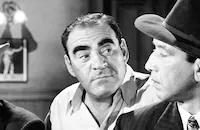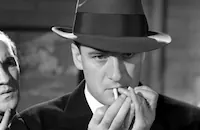Crowded Paradise
Cast & Crew
Fred Pressburger
Hume Cronyn
Nancy Kelly
Mario Alcalde
Frank Silvera
Enid Rudd
Film Details
Technical Specs

Synopsis
Juan Negron Figueroa, a young auto mechanic, plans to leave his home in Puerto Rico to go to New York City and marry Felicia Diaz, a Puerto Rican American who lives in New York, whom he met when she vacationed in Puerto Rico. On New York's upper West Side, Felicia's father objects to the couple's plans. Proud of his own rise from an impoverished immigrant to a skilled union worker, he does not want Felicia to marry a newcomer like he once was, feeling he will then have slaved twenty years for nothing. With a jar containing eighty-five dollars in coins that his mother saved for him to pay for music at the wedding, Juan arrives in New York and lives with a cousin and her family. When Juan visits Felicia, he meets the bigoted superintendent of her building, George Heath, a recovering alcoholic and ex-convict who lives in the basement with his blind wife Louise. George spent two years in prison after slashing Louise with a broken bottle while intoxicated, which blinded her. She now keeps their money under lock and key, and makes him promise not to drink whenever she doles him out some cash. Louise thinks of Felicia as her best friend, but George, although he lusts after the young girl, hates Puerto Ricans. He tries to taunt Juan, asking why, if his country is the "paradise" that he describes, do so many of "you people" leave, and Juan replies that it is too crowded. Juan and Papa Diaz argue about his ability to get a job, and Juan brags that he can find work as a mechanic that will pay seventy to eighty dollars a week; however, because of discrimination against Puerto Ricans and the fact that he is unfamiliar with the equipment used in New York garages, Juan settles for a job as a dishwasher in a cafeteria. When a boxing promoter cannot get his South American heavyweight fighter into the U.S. because the fighter had once been in jail, he calls an underworld colleague, Jack Kaufer, for help. Jack, who had been in prison with George, contacts him, knowing that his apartment house is filled with Puerto Ricans, one of whom, he hopes, will sell his birth certificate that could then be used to prove the fighter is an American citizen. Jealous of Felicia's love for Juan, George arranges for the police to film Juan selling his birth certificate to Kaufer. Juan, feeling that he can't ask Felicia to marry him on the wages he receives as a dishwasher, argues with her when she says she will get a job also. They decide to marry first and argue later, and go to look at apartments. After a landlady who promised Felicia a nice apartment, reneges on their agreement after meeting Juan, the couple rejects a noisy, dark apartment run by a Puerto Rican landlord and his wife. Juan then decides to sell his birth certificate for $800; however, before the deal is consummated, he changes his mind, saying that it is not for sale because his mother's name is on it. At his cousin's crowded apartment, Juan tells Felicia that he will go to trade school for six months to learn all about the new gadgets so that he can make a decent salary. When he kills an animal crawling under the bed with repeated whacks of a broom, Felicia runs home in disgust. Because George has locked the inside door, she knocks on his window, and in the vestibule, George, intoxicated, makes indecent proposals to her, then grabs her when she refuses his entreaties, but she bites his hand and escapes. Not wanting to hurt Louise, Felicia refuses to let her father call the police. Meanwhile, Detective Green asks for Juan's help in capturing Kaufer. Juan refuses, saying he plans to return to Puerto Rico. Green then talks to him about being a patrolman in his neighborhood, which, over the years, housed Irish, Jews and Italians. He relates the rough time that members of those groups had and predicts that Juan also will do all right if he gives himself time. Green says that it may take up to two months to get evidence against Kaufer, but Juan only agrees to help until he leaves in a few days. When Papa Diaz sees how unhappy his daughter is, he agrees to let her marry Juan. She decides she can suffer for six months, living in Juan's cousin's crowded apartment while Juan is in trade school, and she and Juan reconcile. While Louise waits in the Diaz apartment for the wedding party to return from the church, George breaks into the locked drawer where she hides her coins. He gets drunk in a bar and insults a Spanish-speaking man, who walks away rather than get into a fight with him. George then launches into a harangue against Puerto Ricans to a couple of drunken men, one of whom takes George to his apartment and shows him a souvenir German hand grenade that he bought at an army base. Meanwhile, Louise, finding her apartment broken into, calls the police. George comes to the wedding party at the Diaz apartment, and when he sees Juan and Felicia dancing, he destroys the wedding cake. Juan protects George from Papa Diaz, who is furious, and George threatens the group with the grenade. Louise then enters with the police, and when George sees them, he throws the grenade. Juan retrieves it and throws it out the window, but it does not explode, as it is empty. The police allow George to dress before arresting him, and as Louise ties his tie, he violently kisses her. She breaks away and slaps him, then berates him for intending to murder the group at the wedding. Detective Green comes by and tells Juan that he won't be able to use him to capture Kaufer, now that George has been arrested, but that Kaufer is bound to slip up sometime. Juan invites Green to join the celebration, and the couple vows that they both can learn from each other.

Director
Fred Pressburger
Cast

Hume Cronyn

Nancy Kelly
Mario Alcalde

Frank Silvera
Enid Rudd

David Opatoshu

Ralph Dunn
Carlos Montalban
Santos Ortega
Miriam Colon
Marita Reid
Stefan Schnabel
Charles Welch
Miguel A. Rodriguez

Elliott Sullivan

Henry Silva
Mary Bell
Bert Freed
Nita De Soto
Rock Rogers
Jack Davis
Mike Keane
John Graham
Carolyn Sullivan
William E. Gonzalez
Angel Luis Diaz Lebron
Gilberto Diaz Lebron
Crew
Rafael Alers
David Broekman
David Broekman
Fabio Coen
Miriam Colon
Marc Connelly
C. James Digangi
Faith Elliott
Arthur Forrest
Sammy Gallop
James [a.] Gleason
William Gonzalez
Ben Gradus
Ben Gradus
Ben Gradus
Helen Grizuk
Morris Hartzband
Patricia Jaffe
Boris Kaufman
Carl Kent
Beatrice Leon
Neil Matz
Joseph Monserrat
Rita Roland
Lucy Sabsay
Irving Sachs
Walter Sachs
William Schwartz
Clarence O. Senior
Eddie Senz
Terry Stern
Maria Stevens
Richard Sylbert
Florence Transfield
Barbara Wiegand

Film Details
Technical Specs

Quotes
Trivia
Notes
This film was shot in New York City and in Puerto Rico. Location shooting was done in East Harlem and Manhattan, while interiors were shot at the Fox Movietone Studios in New York. Motion Picture Herald praised Boris Kaufman's cinematography, saying he "has caught with a documentarian's eye the essence of his authentic locations, New York's West Side and Puerto Rico." Variety commented that the film was "produced in almost documentary style" and called it "an arty theatre entry." Many of the actors were from the New York stage. Reviews were generally positive concerning the film's subject matter and the acting. Cue praised the film for its depiction of "racial bigotry and economic ostracism, residential restrictions imposed in Harlem's 'yellow ghetto,' and the prejudices of long-time Puerto Rican residents who look upon their newly arrived compatriots as 'foreigners.'" New York Times wrote, "Although it fails to solve the many problems besetting Manhattan's burgeoning Puerto Rican population, Crowded Paradise ... dramatizes a few of these ills with restraint and compassion." They criticized, however, the film's "sleazy facade."
Motion Picture Herald called Mario Alcalde "a sort of Latin Brando type with a casual, natural acting style." Reviews predicted that the film would be appreciated by Puerto Rican-American audiences, and Variety commented, "N.Y. City officials perhaps will be far from happy over some of the scenes or the closeups of ramshackle apartment structures." According to information in the MPAA/PCA Collection at the AMPAS Library, PCA director Joseph I. Breen complained to the production company about a scene in which "George" uses a broken bottle as a weapon, and one in which he pleads to be allowed to keep Felicia's shoe as a memento. He wrote the action "could be indicative of the fact that he is a sex pervert. This well-known token of fetishism-the shoe-we feel too plainly indicates that he is possibly a pervert."

Miscellaneous Notes
Released in United States Summer June 1956
Released in United States Summer June 1956











